

Dreamforce '12: Sales Cloud Product Keynote. Why Print Ads Still Work. “What was the rating and share for our spot in ‘Ally McBeal’ last night?”
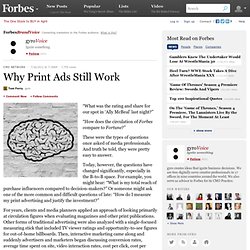
“How does the circulation of Forbes compare to Fortune?” These were the types of questions once asked of media professionals. And truth be told, they were pretty easy to answer. Today, however, the questions have changed significantly, especially in the B-to-B space. Startup Claims 80% Of Its Facebook Ad Clicks Are Coming From Bots. Image via WanderingStan.com UPDATED.
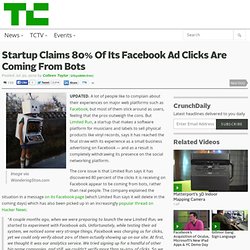
Artist Brands Street Advertising With Biting Error Messages. Print is Dead? Not so Fast. Facebook's Zynga Alliance Demonstrates Its Threat to Google. Facebook knows who you are.
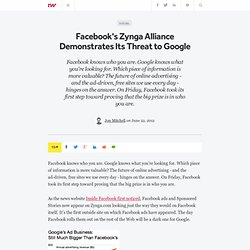
Google knows what you're looking for. Which piece of information is more valuable? The future of online advertising - and the ad-driven, free sites we use every day - hinges on the answer. On Friday, Facebook took its first step toward proving that the big prize is in who you are. As the news website Inside Facebook first noticed, Facebook ads and Sponsored Stories now appear on Zynga.com looking just the way they would on Facebook itself.
Coca-Cola security camera ad. 6 Ways Advertisers Can Adapt To The New Mobile World. Moo.com Lets Businesses Design Cards Using Facebook Pages. Innovative card printing firm Moo.com has extended its Facebook-based card making initiative to businesses, with a new offer that allows companies to design cards using their Facebook Pages for free.
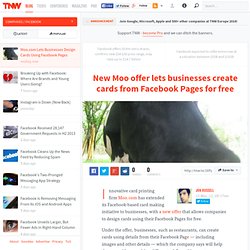
Under the offer, businesses, such as restaurants, can create cards using details from their Facebook Page — including images and other details — which the company says will help them provide something different while making customers aware of their social presence. The news comes after Moo.com introduced an offer allowing Facebook users to print business cards based on their timeline in January, and it is now building on that momentum to give businesses and companies the chance to follow suit. Controversial Facebook campaign features a model stripping for Likes. There’s been a lot of creative and interactive ways brands are utilizing the Like button on Facebook, so it didn’t take long for California-based clothing company Stüssy to realize it could garner new male fans by having a model strip according to the number of Likes the brand receives.
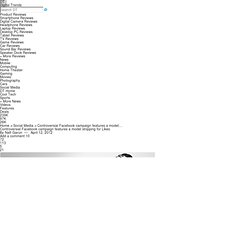
The Dutch fan page for Stüssy features an attractive woman piled up in what we assume are the company’s entire line its latest collection. When a person clicks Like, the page takes you to a flash video of the model in various pictures wearing less clothes, and gets her down to a tank top and a pair of shorts. Advertising Means Nothing If You Don't Have Predictability. In Mobile Advertising, Does Size Matter? It’s the motion in the ocean that counts, right?
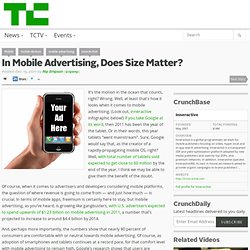
Wrong. Well, at least that’s how it looks when it comes to mobile advertising. (Look out, inneractive infographic below!) If you take Google at its word, then 2011 has been the year of the tablet. Or in their words, this year tablets “went mainstream”. Of course, when it comes to advertisers and developers considering mobile platforms, the question of where revenue is going to come from — and just how much — is crucial. And, perhaps more importantly, the numbers show that nearly 80 percent of consumers are comfortable with or neutral towards mobile advertising. YouTube's Most-Shared Ads of 2011. If we've learned anything about viral advertising in 2011, it's this — you can't touch The Force.
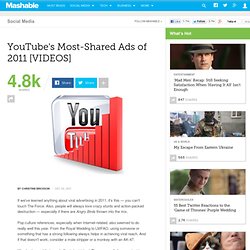
Also, people will always love crazy stunts and action-packed destruction — especially if there are Angry Birds thrown into the mix. Pop culture references, especially when Internet-related, also seemed to do really well this year. Facebook Timeline for Brands: The Complete Guide. Now that Facebook Timeline has finally rolled out for brands, companies have endless opportunities to refresh their social media strategy.
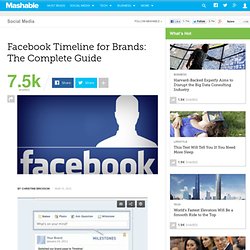
7 Marketing Examples Using Facebook Fan Pages. Though it’s important to register an account on multiple social media platforms, companies must do more than simply maintain a steady presence and gradually grow their followers.
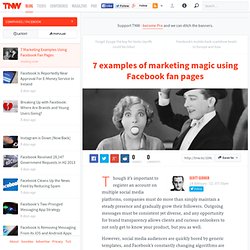
Outgoing messages must be consistent yet diverse, and any opportunity for brand transparency allows clients and curious onlookers to not only get to know your product, but you as well. However, social media audiences are quickly bored by generic templates, and Facebook’s constantly changing algorithms are pushing companies to engage their fans in new ways, rather than just collecting them. Fan Pages are the place to create a buzz about your brand and sustain it among your current and future followers…at a potentially exponential rate. I asked a panel of successful young entrepreneurs the following question: Marketing Genius: Two Twins Giggling As They Sell You Designer 3D Glasses. If you thought Apple’s marketing squad was genius, just wait until you watch this Kickstarter video from Ingri:Dahl.

If you aren’t already familiar with the “company,” which you shouldn’t be, it’s basically two sisters named Kine and Einy, and they want to sell you a 3D clip-on for your glasses. It’s actually rather clever. Rob Walker: Package It Black. At my local convenience store yesterday, Marlboro Blacks caught my eye. No surprise, given that a pack was on prominent display. 5 Proven Ways to Generate Revenue From Facebook. Brian Carter is author of The Like Economy: How Businesses Make Money With Facebook and co-author of Facebook Marketing: Leveraging Facebook's Features For Your Marketing Campaigns. He is a keynote speaker, trainer and consultant. Facebook, with its 800+ million users, presents a huge opportunity for business.
But the first question people ask is, "Can it really generate money? "